What is a rotary encoder? Structure - Principle of operation - Application
Are you new to the field of mechanical processing? Don't know what an Encoder is? How is it structured and how does it work? Which professions need to use this type of equipment? Then you've come to the right place. In this article, Amazen will provide you with the most general information about the Encoder, also known by another name, the rotary encoder. Come find out with me!
1. What is a rotary encoder?
Rotary encoder, also known as Encoder (Rotary Encoder), is a term used to refer to an electrical device that can change linear or circular motion into a digital signal or pulse. Thanks to the Encoder, the electric motor will be positioned accurately according to the control signals.
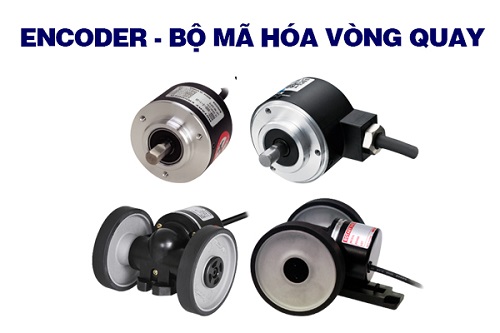
Encoder is mainly used to detect the position, direction of movement, speed... of the motor by counting the number of revolutions that the shaft rotates. Currently, Encoder is commonly used in automatic control systems. Because electronic systems in industrial machinery and equipment often operate at high speeds, they are combined with optical codes. As a result, system speed is precisely increased, cycle times are reduced, and efficient operation is increased.
2. General structure of the Rotary Encoder
The Encoder includes the following main parts:
- Body and shaft
- Light source: 1 LED light
- Code disk: has a small groove around the axis. When this disk rotates and shines an LED light on the surface of the disk, an interruption will occur. The grooves on the disc divide the circle 360o into equal angles. A disc can have many rows of grooves from the circular center.
- Photosensor: is a photoelectric eye that receives signals from the rotating disc.
- Electronic board: helps amplify the signal
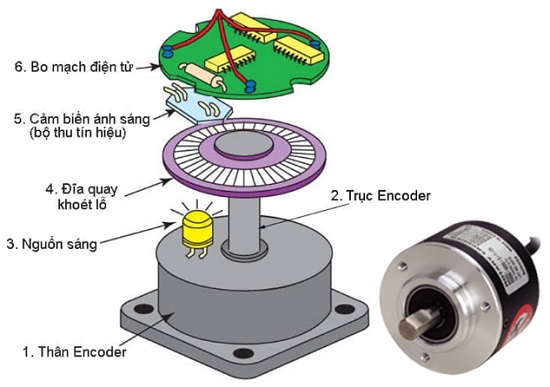
3. Operating principle of Rotary Encoder
When the Encoder moves, the converter will process the movements and convert them into electrical signals. These signals will be transmitted to PLC control devices and processed to represent the values to be measured using a separate program. For signals with or without light shining through. People can still record whether the LED light shines through this hole or not. Furthermore, the number of pulses counted and increased is calculated by the number of times the light is cut off.
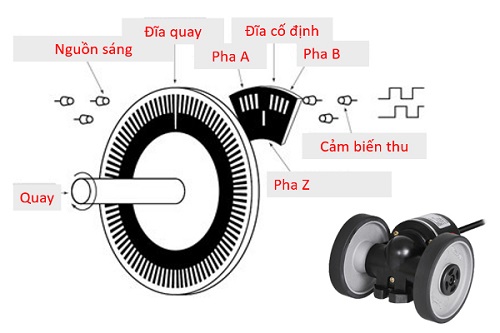
For example, on a disc there is a single hole, when each time the eye receives 1 LED signal, it means the disc has rotated 1 revolution. Therefore, this is the basic operating principle of the Encoder, but for many other types of Encoder, when the rotating disc has more holes, the received signal will be different. You can refer to the simulation video below to understand more about the operating principle of the encoder.
4. Classification of Rotary Encoders
Absolute rotary encoder
Absolute encoder's English name is Adsolute encoder. As the name suggests, this Encoder allows us to receive signals about their exact location without the user needing any additional processing steps.
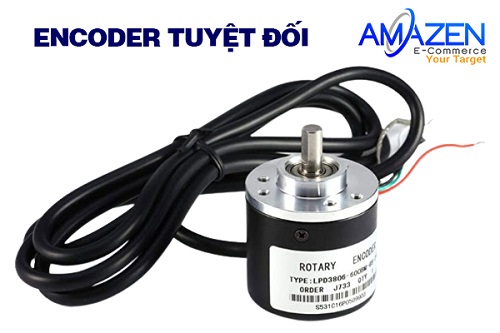
The structure of Absolute Encoder includes:
- Light emitter (LED)
- Light receiver sensitive to emitted light (photosensor)
- The encoder disk contains a ribbon that carries the signal
Basic features of the encoder line include:
- Disk usage in binary or Gray code
- The encoder disk at Encoder is made from transparent material, the disk surface is divided into equal angles with concentric circles.
- Advantage: retains absolute value when Encoder loses power
- Disadvantages: high cost because of complex manufacturing, difficult to read signals
Relative rotary encoder
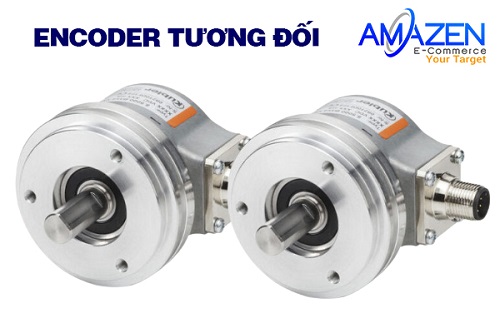
The relative encoder's English name is Incremental encoder. This type of device emits a gradually increasing or cyclical signal. With the following characteristics:
- The encoder disk consists of a series of pulse-generating tapes, usually divided into many equal and evenly spaced holes
- The material can be transparent to allow light to shine through
- An Encoder with only 1,2 or maximum 3 hole rings, and usually an additional positioning hole
- Advantages: low cost, simple manufacturing, easy processing of returned signals
- Disadvantage: susceptible to pulse errors when returned. Errors will accumulate during long-term operation
Classify encoders by technology
Besides the absolute and relative encoder types, we also have a number of other classifications such as:
- Magnetic encoder (magnetic field type)
- Encoder Mechanical (mechanical type)
- Resistive encoder (resistive type)
- Optical encoder (optical type)
5. Parameters to consider when choosing a Rotary Encoder
To choose the right Encoder for your needs, Amazen will tell you the following parameters that you need to pay attention to:
- Shaft diameter, shaft shape: Encoder has positive or negative shaft shape, shaft diameter from 5~50mm. Usually diameters larger than 6mm will be negative shaft type (concave shaft).
- Resolution: also known as number of pulses - corresponds to the number of encoder signals counted when rotating 1 revolution. The higher the number of pulses the encoder has, the higher the price. Elevators usually use 1024p/r pulse, machine manufacturing is around 360p/r, 1000p/r. There are also pulses up to 6000p/r or 6pr.
- Voltage: Encoder often burns out due to not paying attention to the power supply when installing. If the encoder has a voltage range of:5~24V, it is very easy. However, with some large shaft encoders: 30-40mm, the machine's encoder will often encounter a specified voltage: 5V, 12V or 15V. Therefore, you must read carefully before installing. Because the encoder is burned out, it is necessary to replace the whole unit, which is very expensive.
- Output: AB, ABZ, AB inverted, ABZ inverted. You can easily identify the output signal by looking at the wire number indicated on the label.
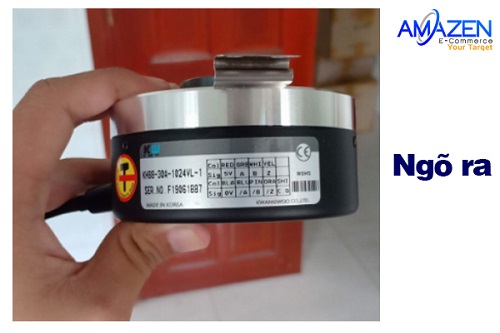
You can see very clearly that the encoder above has an inverted ABZ output pulse
- Output type: There are many output types, briefly listed: Open Collector, Voltage Output, Complemental, Totem Pole, Line Driver. Output type regulates power supply, information reader...
- Cable: the longer the cable, the more susceptible it is to interference. Standard wire from 1-3m. Sometimes up to 10m according to usage needs.
- Accessories: Included positive axis encoder is Coubling, negative axis encoder is Pass. Coubling helps connect the positive shaft encoder to the positive shaft motor, Pass helps attach the encoder to the machine. A negative axis encoder has 1-2 passes depending on the type.
6. Distinguish between absolute and relative rotary encoders
- Absolute encoder (Absolute): Corresponds to an 8-bit rotating disk or 8-track array, giving output in digital code (BCD), Binary (binary), Gray code.
- Incremental encoder (Relative): Corresponds to a 2-bit disk, giving AB phase square pulse output, or ABZ or inverted ABZ. The Encoder type with 2 pulse signals A and B is the most common. The Z slot signal is the signal to determine if the motor rotates one revolution.
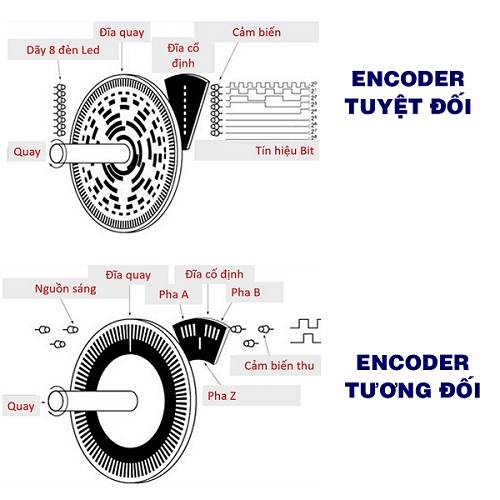
Compare relative and absolute encoders
| Absolute encoder |
Relative encoder |
|
Absolute encoder corresponds to 8-bit rotating disk or 8-track array, giving output as digital code (BCD), Binary (binary), Gray code
→ Can measure speed based on the increase or decrease in the number of pulses per unit of remaining time. Absolute Encoder has the same function but has the addition of determining the coordinates of each point on the rotation
|
The encoder is relatively corresponding to a 2-bit disk, giving output in the form of square pulses of phase AB or ABZ, ABZA|B|Z (Can be read as A inverted, B inverted, Z inverted)
Encoder type produces two common pulse signals A and B
The Z slot signal is the signal to determine if the motor rotates one revolution
→ Can remember location when power is lost because each location has its own signal code |
7. Application of Rotary Encoder (Encoder)
Encoders are considered an indispensable resource in many applications. Whether related to many different areas such as speed, direction or distance, encoder capabilities will help users of this information to determine accurately.
Application of speed expression
For a pump to pump liquid into a tank, it needs to be installed with an inverter. Then the liquid pumped into the tank must have a certain speed. The encoder connected to the inverter has the function of helping to respond to the actual flow rate of the liquid.
Applications in industries
Car
In the automotive industry, encoders are used in the production of mechanical motion sensors. Has the ability to control speed.
Consumer electronics and office equipment
The encoder is considered a PC, printer or scanner based device
Industry
Encoders are used in labeling, packaging and machine manufacturing with single and multi-axis motor controllers.
Counting quantity: When installing an encoder into the program of the product conveyor belt, it will help us confirm each bottle of product entering and exiting the station on the conveyor belt. If the bottles do not leave the station within the pre-programmed time, the machine has been damaged.
Medical
The encoder is used in medical scanners. Not only that, there is also the function of microscopic or nanoscopic motion control of automatic devices and distribution pumps.
Army
Used in positioning antenna design
Scientific instruments
Positioning the observing telescope.
8. Which brand of Rotary Encoder should I buy?
Autonics Encoder
The Autonics rotary encoder is made from durable materials, highly safe, compact and lightweight, allowing for easy disassembly and installation in small spaces. In particular, Autonics encoders can operate well in harsh environmental conditions and have a long service life.
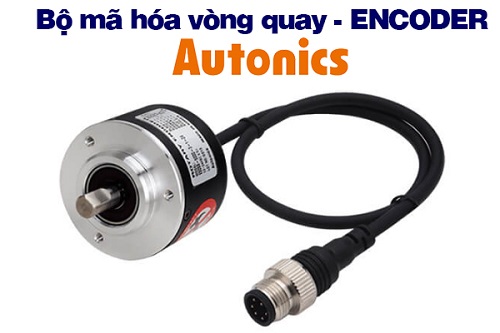
Omron rotary encoder
The Omron encoder is designed according to Japanese technology, including many good quality semiconductor components to measure the number of revolutions equivalent to its resolution, for example, 1 rotation has 360 pulses from which the programmer can can calculate and program to accurately control the speed of the motor. In particular, the Omron encoder outputs 3 phases A, B, Z so users can use it to see the forward or reverse rotation direction.
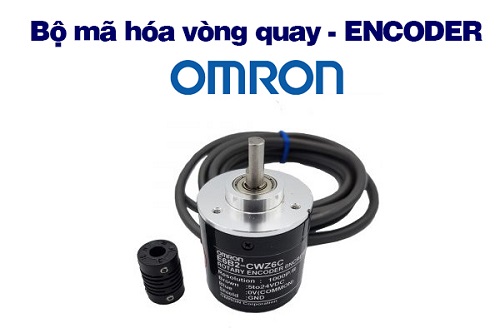
Hanyoung rotary encoder
Currently, Encoder Hanyoung is a product that is receiving good reviews in terms of both quality and price. This brand's sensor devices are designed and assembled carefully and firmly with built-in joints to transmit motion. Reliability, high accuracy, stable operation and long life are the most outstanding advantages of rotary encoders manufactured by Hanyoung.
Buy cheap - genuine rotary encoders at: "Amazen Automation Equipment"
Epilogue
The two most commonly used types of encoders are relative and absolute encoders. Through the operating principle, the advantages and disadvantages of each type, and the parameters to note when choosing a device, I believe you have grasped the most essential information about rotary encoders.
In case you need to buy an encoder or have questions or need further advice, don't hesitate to contact Amazen via:
- Hotline: 0934 399 068 - Sales: 0938 072 058
- Email: amazen@amazen.com.vn
With a team of highly specialized technical support and sales consultants, our company is confident that it will bring you the best purchasing experience.
Amazen commits that all Encoder products we currently offer are 100% genuine, brand new, quality guaranteed and have complete accompanying certification documents.